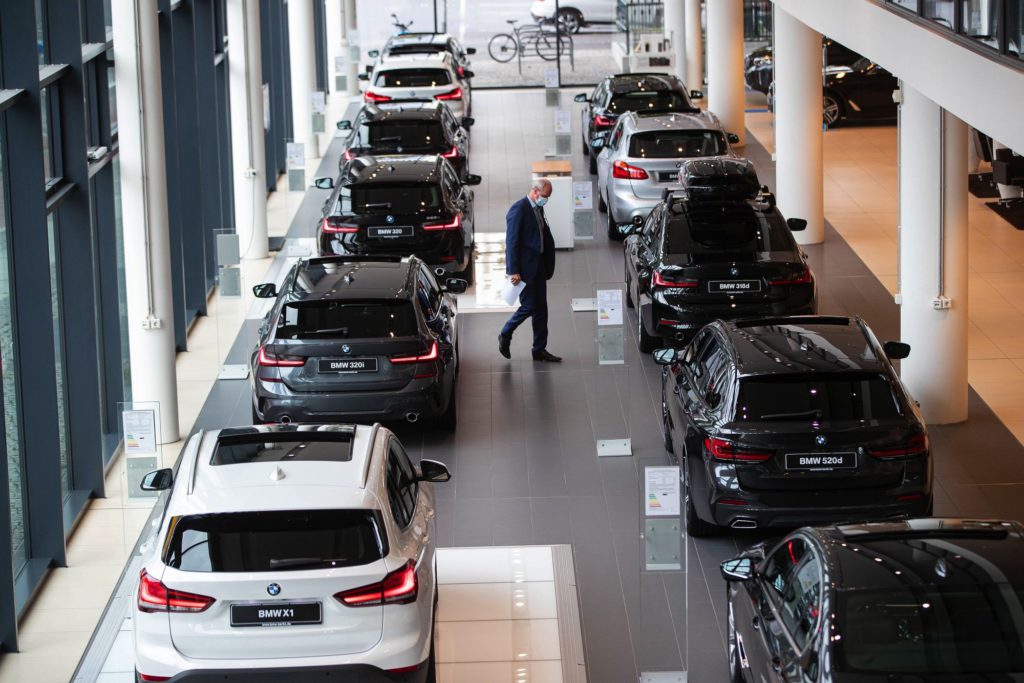(Bloomberg) — BMW AG said operating returns for its automotive business will remain robust this year, even as the war in Ukraine and a global semiconductor shortage weigh on production.
The company on Wednesday lowered its estimate for automaking returns to between 7% and 9% for 2022, noting that the target range would have been 8% to 10% were it not for Russia’s invasion. BMW expects deliveries to remain flat at about 2.5 million.
Shares were up 3.2% at 1:09 p.m. in Frankfurt.
While many European manufacturers have expressed uncertainty about the impact of the war in Ukraine, BMW is among the first to quantify the impact on its business. Like others, BMW has been forced to idle some factories amid the disruption to supplies such as wire harnesses, though most of the Bavarian company’s operations are already restarting.
“We’re optimistic we can mitigate the wire harness shortages,” Chief Executive Officer Oliver Zipse said in an interview with Bloomberg Television. BMW has more than a single supplier in Europe and is able to cope with the situation, he said.
BMW has similarly fared better than its rivals navigating the chip shortage — another crisis that has shut down auto production lines around the globe. BMW said Wednesday that the scarcity for semiconductors will remain a drag on production for at least the first half of the year.
Wild swings energy prices have put pressure on carmakers’ margins, though BMW’s hedging strategy will offset the price hikes through the end of the year, Chief Financial Officer Nicolas Peter said during a call with reporters. Surging prices for raw materials and currency changes, however, will continue to have a similar impact on costs this year as in 2020 and 2021.
The carmaker said it’s accelerating its shift to electric vehicles and expects 15 fully electric models to be in production this year, including the rollout of the new i7 sedan. The company also said it is developing new battery technology and could deliver early on its target of having fully battery-powered vehicles making up half its global sales by 2030.
BMW previously said that it expects sales of fully electric vehicles to double in 2022, as the company’s i4 coupe and iX SUV go on sale in major markets.
Overall earnings for BMW, including its finance and motorcycle segments, should increase significantly this year, the company said, helped by the full consolidation of its Chinese BMW Brilliance joint venture.
What Bloomberg Intelligence Says:
BMW’s muted 2022 guidance was as we expected — given the negative Russia-Ukraine war implications — leaving room for upgrades. Management sees an automotive Ebit margin of 7-9% vs. an adjusted 8.8% in 2021. This sensible outlook factors in flat 2022 deliveries and comes despite the first-time consolidation of China operations, generating a significant uplift to auto revenue and Ebit.
— Michael Dean, BI automotive analyst
BMW 7-9% Margin Outlook Appears Conservative But Sensible: React
BMW got the nod from Chinese authorities in February to raise its stake in the business with Brilliance China Automotive Holdings to 75% from 50%, one of the first Western automakers to benefit from the relaxing of China’s foreign ownership rules. The inclusion will have a positive effect of between 7 billion euro ($7.7 billion) and 8 billion euro on group earnings before taxes.
BMW Chinese venture assembles BMW-branded models for sale locally and the all-electric iX3 sport utility vehicle, which is also exported to global markets.
(Updates with CFO comment in seventh paragraph.)
More stories like this are available on bloomberg.com
©2022 Bloomberg L.P.











